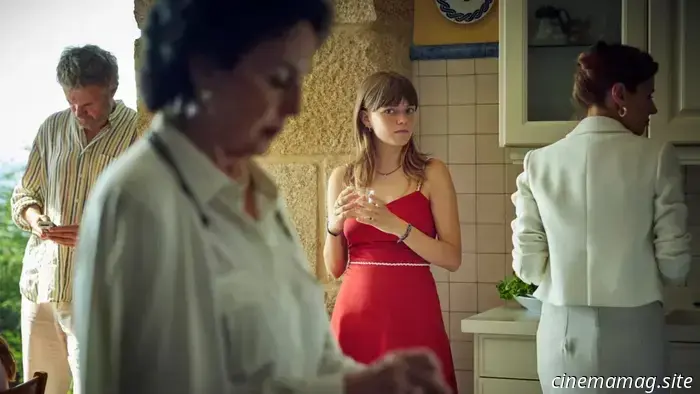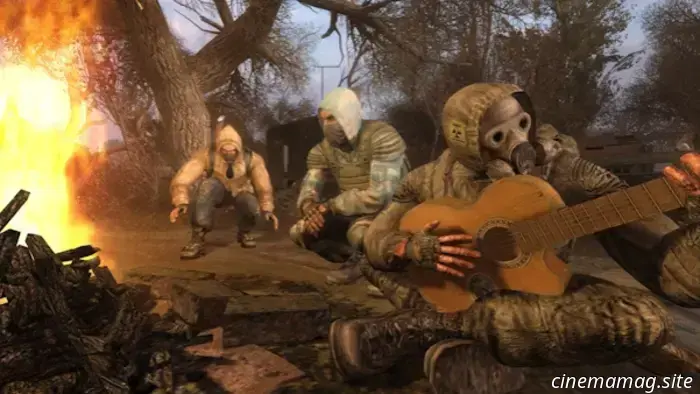
Cannes Review: Carla Simón's Romería Explores Personal Themes of Intergenerational Conflict
Following the understated tone of her Golden Bear-winning film Alcarràs, Carla Simón presents Romería, yet another narrative centered on generational conflict. This film explores the family stories that are openly shared and those that remain hidden, set against Spain’s Atlantic coast, where 18-year-old orphan Marina (Llúcia Garcia) seeks to reconnect with her paternal relatives. It also addresses themes of displacement and a longing for lost heritage, which resonate deeply for a director whose parents passed away from AIDS during her childhood, and who reunited with her father's family in Vigo, Galicia, at the same age as Marina. Simón has consistently drawn from her own life experiences in her filmmaking; Romería may be her most intimate project to date.
The narrative unfolds over five days in 2004, incorporating an extensive flashback to 1983 in the latter half. Marina, an aspiring filmmaker, is preparing to attend college but requires her parents' death certificates to apply for a grant. She travels to Vigo, reconnecting with her uncle Lois (Tristán Ulloa) and, through him, her other relatives. Simón employs her mother’s diary as a structural element, dividing Romería into chapters, each introduced with quotes, as if revealing her life gradually. In one instance, Simón seamlessly integrates her own contemporary digital camera footage from the original journey—though aside from that and the appearance of a Nokia 3310, there is surprisingly little to evoke the era. The film captivates with its sincerity, including moments of sexual tension between Marina and her newfound cousin Nuno (Mitch Martín), who later appears in flashbacks representing her father. A similar dynamic is suggested with her uncle, Iago (Alberto Gracia), who was closest to her mother and thus deeply affected by Marina's return, yet Simón handles this potentially awkward aspect of their reunion with commendable sensitivity and respect.
Through Iago, Simón unravels additional dimensions of the story, examining the darker elements of Marina’s parents’ history while simultaneously forming a closer bond with their legacy. Marina learns that her parents once crossed the Atlantic by boat, only to become entangled in the heroin trade, ultimately falling victim to addiction and illness. This remains a painful memory for the family, who kept her father isolated indoors during his sickness. The narrative builds to a gathering around the midpoint, where Marina and her cousins visit their grandparents in an upscale hillside villa, showcasing a remarkable moment as Marina anticipates how this distant, almost mythical relative will receive her. Garcia excels in this scene, embodying a barely contained excitement that shifts in the subtlest ways. She shines again moments later when the young relatives form a line to greet their grandfather, waiting as he hands each of them a little money. As the camera captures Marina’s turn, Simón invites the audience to share in her tension.
A premiere in the Cannes competition marks a first for this director and feels like a natural progression following her Berlinale victory, although I wonder if such prestigious surroundings could potentially hinder it. Romería offers depth, a vivid sense of place and personal history, and unmistakable hints of inner lives, yet its aesthetic and formal modesty may contrast sharply with the typical Cannes offerings, making it prone to being overlooked. Simón's boldest choice is to transport us back to her parents’ troubled past in the ’80s, with Marina representing her mother and Nuno her father; both appear extraordinarily appealing in the radiant sunlight, embodying youthful love and freedom. I doubt it will significantly impact the festival scene, but Romería’s themes of closure and self-discovery make for an engaging viewing experience.
Romería premiered at the 2025 Cannes Film Festival.
Other articles
 S.T.A.L.K.E.R.: Legends of the Zone Trilogy Enhanced Edition is now available.
GSC GameWorld has unveiled the launch of S.T.A.L.K.E.R.: Legends of the Zone Trilogy Enhanced Edition for PC, PlayStation 5, and Xbox Series X|S. This new edition includes improved versions of Shadow of Chernobyl from 2007, Clear Sky from 2008, and Call of Pripyat from 2009. The trilogy has been fully revamped for modern platforms, allowing players to […]
S.T.A.L.K.E.R.: Legends of the Zone Trilogy Enhanced Edition is now available.
GSC GameWorld has unveiled the launch of S.T.A.L.K.E.R.: Legends of the Zone Trilogy Enhanced Edition for PC, PlayStation 5, and Xbox Series X|S. This new edition includes improved versions of Shadow of Chernobyl from 2007, Clear Sky from 2008, and Call of Pripyat from 2009. The trilogy has been fully revamped for modern platforms, allowing players to […]
 Cannes Review: Highest and Lowest Ratings for a Minor Collaboration Between Spike Lee and Denzel Washington
Spike Lee's films are recognized for their expansive portrayal of New York City, especially Brooklyn, with a strong emphasis on Bed-Stuy—rarely showcasing the upscale, Gotham-like, cobblestoned streets of Dumbo. Apart from a brief documentary created for the Brooklyn Chamber of Commerce in 2016, Lee hasn't featured Dumbo in a film since his 1986 debut, She’s Gotta.
Cannes Review: Highest and Lowest Ratings for a Minor Collaboration Between Spike Lee and Denzel Washington
Spike Lee's films are recognized for their expansive portrayal of New York City, especially Brooklyn, with a strong emphasis on Bed-Stuy—rarely showcasing the upscale, Gotham-like, cobblestoned streets of Dumbo. Apart from a brief documentary created for the Brooklyn Chamber of Commerce in 2016, Lee hasn't featured Dumbo in a film since his 1986 debut, She’s Gotta.
 The horror action game Frog Legs leaps onto Steam.
Independent developer Elliott Dahle has revealed the launch of his amphibian horror action game, Frog Legs, on PC through Steam. This brief, narrative-focused game centers around an ordinary frog as he leaps, runs, and ribbits in an attempt to flee from his past. Featuring arcade segments inspired by Frogger, boomer shooter gameplay, and a haunting narrative, Frog Legs represents horror with […]
The horror action game Frog Legs leaps onto Steam.
Independent developer Elliott Dahle has revealed the launch of his amphibian horror action game, Frog Legs, on PC through Steam. This brief, narrative-focused game centers around an ordinary frog as he leaps, runs, and ribbits in an attempt to flee from his past. Featuring arcade segments inspired by Frogger, boomer shooter gameplay, and a haunting narrative, Frog Legs represents horror with […]
 Marvel takes a trip down memory lane with Retrovision variant covers.
Marvel Comics has revealed plans to transport variant cover collectors back in time this July with its 'Retrovision' variants, featured across 22 ongoing titles. This initiative will have contemporary artists honoring the classic Silver Age aesthetic by combining elements of the past with today's style. You can check out […]
Marvel takes a trip down memory lane with Retrovision variant covers.
Marvel Comics has revealed plans to transport variant cover collectors back in time this July with its 'Retrovision' variants, featured across 22 ongoing titles. This initiative will have contemporary artists honoring the classic Silver Age aesthetic by combining elements of the past with today's style. You can check out […]
 Obscure Cult Films from the 80s You Might Have Overlooked
Casey Chong presents a collection of bizarre cult movies from the 80s that you might have overlooked… One of the greatest aspects of watching films is the wide range of genres, spanning from mainstream, audience-friendly productions to independent films, and even to those that challenge genre norms or are simply odd. These films can be those where logic [...]
Obscure Cult Films from the 80s You Might Have Overlooked
Casey Chong presents a collection of bizarre cult movies from the 80s that you might have overlooked… One of the greatest aspects of watching films is the wide range of genres, spanning from mainstream, audience-friendly productions to independent films, and even to those that challenge genre norms or are simply odd. These films can be those where logic [...]
 The initial trailer for the historical drama Chief of War, featuring Jason Momoa, has been released.
Apple TV+ has released the initial trailer for Chief of War, an upcoming historical drama series created by writer and executive producer Jason Momoa. Set in the Hawaiian Islands during the late 18th century, the series draws inspiration from real events and follows the story of warrior Ka’iana (Momoa) as he strives to unite the islands before […]
The initial trailer for the historical drama Chief of War, featuring Jason Momoa, has been released.
Apple TV+ has released the initial trailer for Chief of War, an upcoming historical drama series created by writer and executive producer Jason Momoa. Set in the Hawaiian Islands during the late 18th century, the series draws inspiration from real events and follows the story of warrior Ka’iana (Momoa) as he strives to unite the islands before […]
Cannes Review: Carla Simón's Romería Explores Personal Themes of Intergenerational Conflict
Building on the understated style of her Golden Bear-winning film Alcarràs, Carla Simón presents Romería, yet again exploring themes of generational conflict. This film delves into the narratives that families decide to share and those they keep hidden, set against the backdrop of Spain's Atlantic coast. Here, 18-year-old orphan Marina (Llúcia Garcia) seeks to reconnect with her paternal roots.
